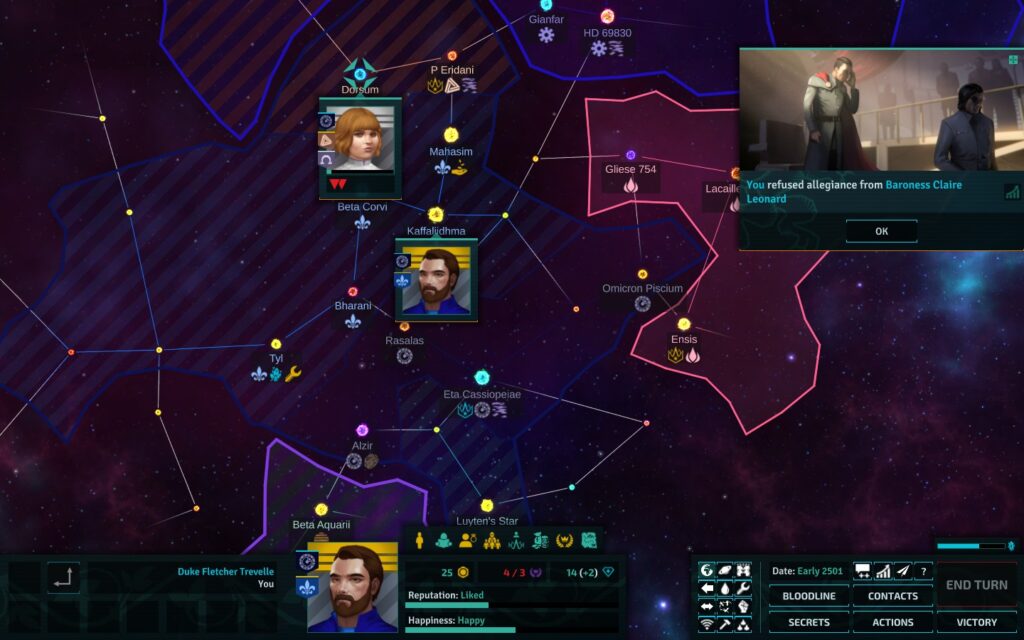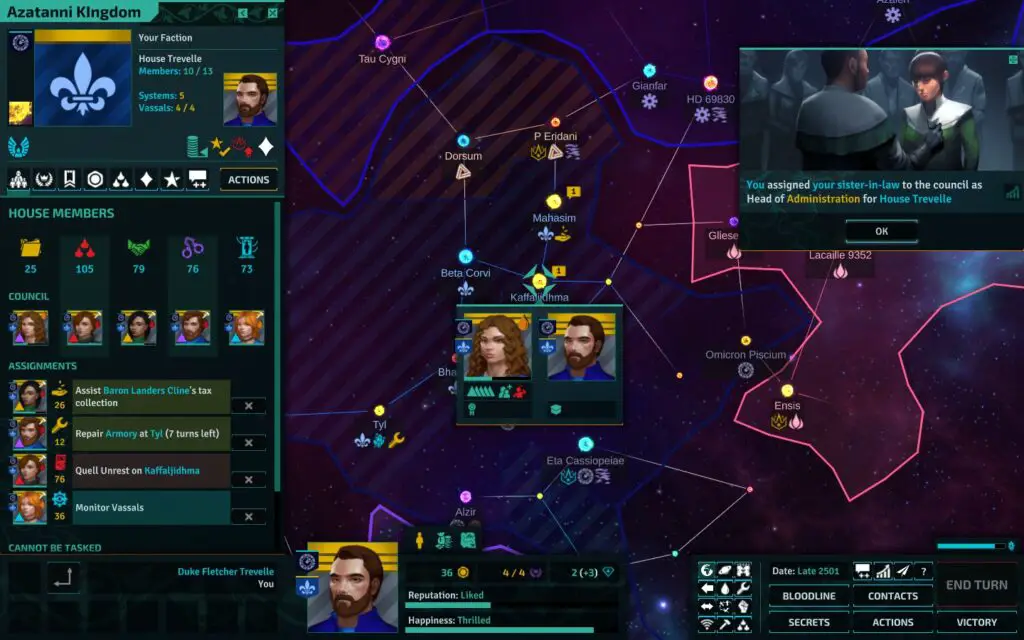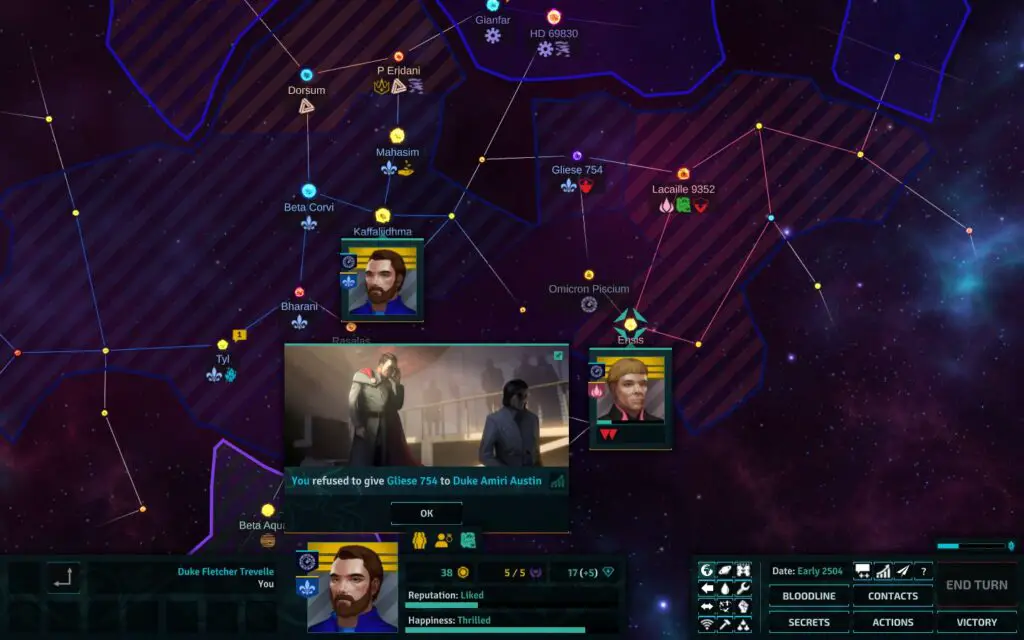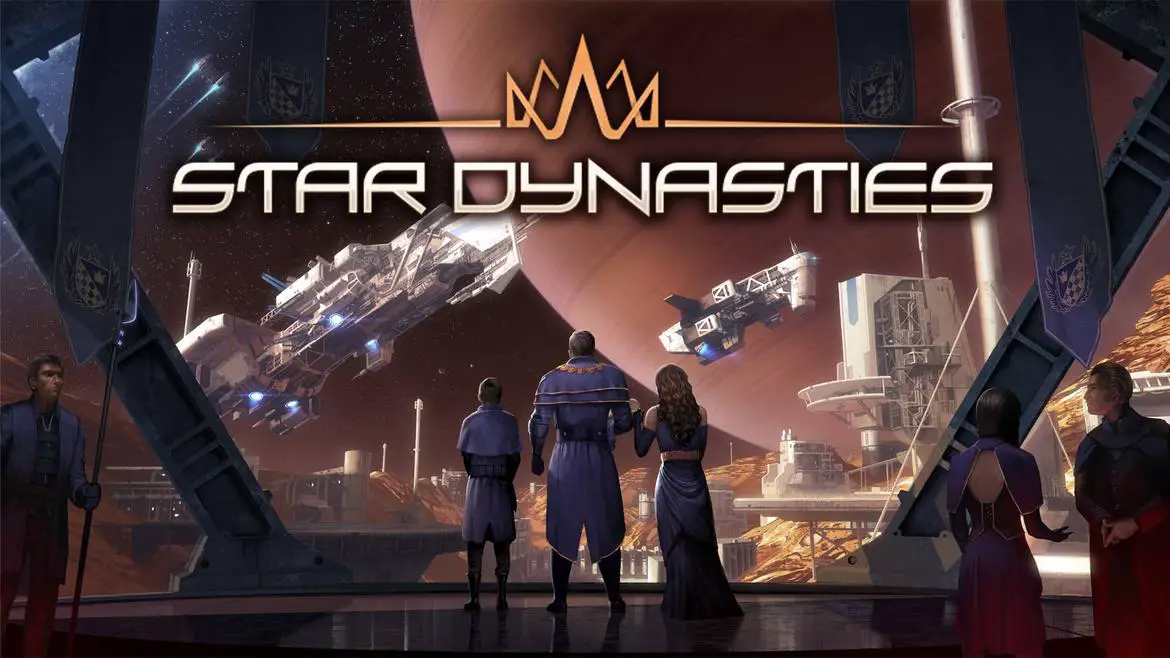Picture the scene: It’s tense at the royal court as the heir, a rebellious hellraiser barely eighteen, is brought before his father, the duke. A member of the court reads out the list of allegations against the young noble, who’s expected to take charge of the ailing kingdom one day. The duke sits and listens in pained silence before ordering the punishment: a sentence of manual labor.
Meanwhile, the heir’s younger sister, known to be humble and patient, watches on from the shadows.
You’ve pictured something like Crusader Kings, right? Tapestries on the walls, a destrier saddled outside, guards with halberds at the ready? Well, think again, for Star Dynasties is a sci-fi game, set in the 26th century.
Create Your Kingdom
Players take on the role of a feudal ruler of a “kingdom”, which they’ll create using a point-based system. A player’s house can be honorable, kind and just – or vicious, cruel and calculating. First you’ll pick your color scheme and select your sigil, and then it’s time to create your nobles!

Character creation also uses points. You’ll start by defining the head of the family and the ruler of the kingdom. Then you can create your spouse, your children, and even siblings and retainers. You must, however, make sure to satisfy the game’s conditions related to points and minimum numbers of traits.
You can create a brave duke or duchess; make them younger or older; gay, straight or bisexual; even give them a nifty haircut! Just don’t try to pick a nice outfit – they all are terribly garish!
For players who’re in a hurry, with no imagination, or who just don’t care to create a custom family, you can get the game to generate one for you. It has some interesting ideas about names, though, which for me compromises the immersion somewhat. Though, this really just comes down to personal preference.
Factions and States
Once you’ve created your house, Star Dynasties drops you headlong into its procedurally generated galaxy, divided between factions and kingdoms. The major states are ruled by archons (an equivalent of monarchs), dukes, or barons. There’s a feudal system of interconnected vassals, but it provides no guarantee they’ll cooperate. You’ll often see rulers, sworn to the same liege-lord, warring with each other for territory!
One of the first things you can do is select the heads of your departments. The positions sort of correspond to the court roles in CK. The bureaucrats provide bonuses to your skills (administration, diplomacy, military, science and security) and can be dispatched on missions. They can help your vassals raise more taxes, repair damaged facilities, or they can even engage in nefarious schemes, like planning attacks or assassinations!
The Action System
So far, it sounds a lot like Crusader Kings, but turn-based and with a sci-fi skin. But the gameplay includes a number of major changes. For example, pretty much every single action requires a named character to go and do it. So rather than faceless minions, you’ll send your mother-in-law to organize defenses in a border star system, your kid-brother to rebuild an armory, or your wife to improve relations with your liege-lord. There’s a limit to how much you can do, once you’ve assigned each character an action. The system, as such, is both a blessing and a curse.

There’s also a limit to the number of vassals you can have – and, therefore, to how much “land” you can control. It is possible to bump it up with strong administration and unlockable perks in the nifty “bloodlines” tree. However, the purpose of the mechanic is to serve as a sort of break, by making too-large kingdoms unwieldy.
In addition, the game also limits how many family members you can have at once. If you exceed it, you start suffering from various problems, including a significant drop in reputation. Apparently in this setting there is fairly strict population control! Combine that with the “you need a character to carry out a task” system, and you definitely need to be careful with what you do, and when.
Suspicious Behavior
Once you’ve given all your orders or ran out of action points, it’s time to hit that End Turn button and see what happens. Pop-ups will inform you about various events, like suspicious behavior from a family member, scandalous actions by your heir, or the uncovering of some old data caches. The game tends to give you a good indication of what sort of effects you can expect from the actions and decisions you make. As such, you’ll rarely have to rely on your instincts alone in your choices. It also features some decent chains of events leading to fun emergent story-telling, which can quickly alter the game state.
In addition, you’ll also get some pop-ups regarding your neighbors. The events can include them plotting against each other, looking to marry eligible members of your family (apparently being single in this game’s universe isn’t allowed!) and waging war. In the latter event, you sometimes can join in, getting rewards for your support.
Combat and Technology
There’s no research per se in Star Dynasties. The society seems to assume that technology cannot be replicated or advanced anymore, locking the game into a technological stasis. The game is vague about other technological details, but warfare is entirely ship to ship and has a bit of a Star Wars feel to it. Don’t expect to see any major battles, though – it’s all quite abstract.

In fact, one of my grumbles about Star Dynasties is that the combat is maddeningly incomprehensible. During my second major playthrough, I’ve been expanding successfully for a while, with my kingdom looking quite powerful. I obtained a claim on a star system that bordered mine and made a play for it after planning an attack. And lost – completely. My enemy, despite being far smaller than me, had a much larger fleet, and I’m not sure how I could know that. Perhaps it’s my lack of familiarity with the system. Still, it was very frustrating.
Graphics and UI
Another issue is with the game’s looks. While the map is nice enough, the overall presentation is rather weak. In addition, the UI causes a lot of clicking and digging around to find actions. Although some recent updates have helped with that. Character graphics can be a bit simplistic, making it hard to remember who these people are, or why should you care about them. Add to this the often very silly random names – and the game universe ends up lacking a consistent feel, which can be a serious barrier to immersion.
The Bloodlines DLC
The Bloodlines DLC does add some nice features. These largely concern your children, whom you can now educate – or hand off to other members of the court or even other nobles to be educated, à la Crusader Kings. It also lets you customize your household, which to me was vital. I just couldn’t buy into my family with the daft names and set-ups that the game would come up with.
However, it’s hard not to feel like all of this should’ve been there from the start, rather than as a separate, paid DLC. The game costs around £20+, which already isn’t cheap. Still, Star Dynasties is the work of a small team with an active dev, keen to make improvements. In fact, it’s already had some great updates over the last year. Sadly, though, as it stands it’s hard to offer a strong recommendation.
Overall
The game just feels very feature bare as of now. Often I found myself just clicking End Turn over and over to see if anything interesting would happen. There’s also a bit too much randomness, which is exacerbated by procedural generation. For example, in my last playthrough I lost a vassal, and with it one quarter of my starting position, on the second turn. He simply decided to quit my faction for a more powerful neighbor. It was hard to understand what I could do, and this put a serious damper on the whole game.
The sci-fi setting could also be more thought-out. The game suffers from its somewhat vague, somewhat generic style. I think more writing, maybe getting in some freelancers to help out, could give it a stronger feel.
It’s not all doom and gloom, though. There’s a good game in there and, with time and work, I think it’ll fully emerge. At the moment, however, Star Dynasties isn’t going to succeed to the throne anytime soon.







